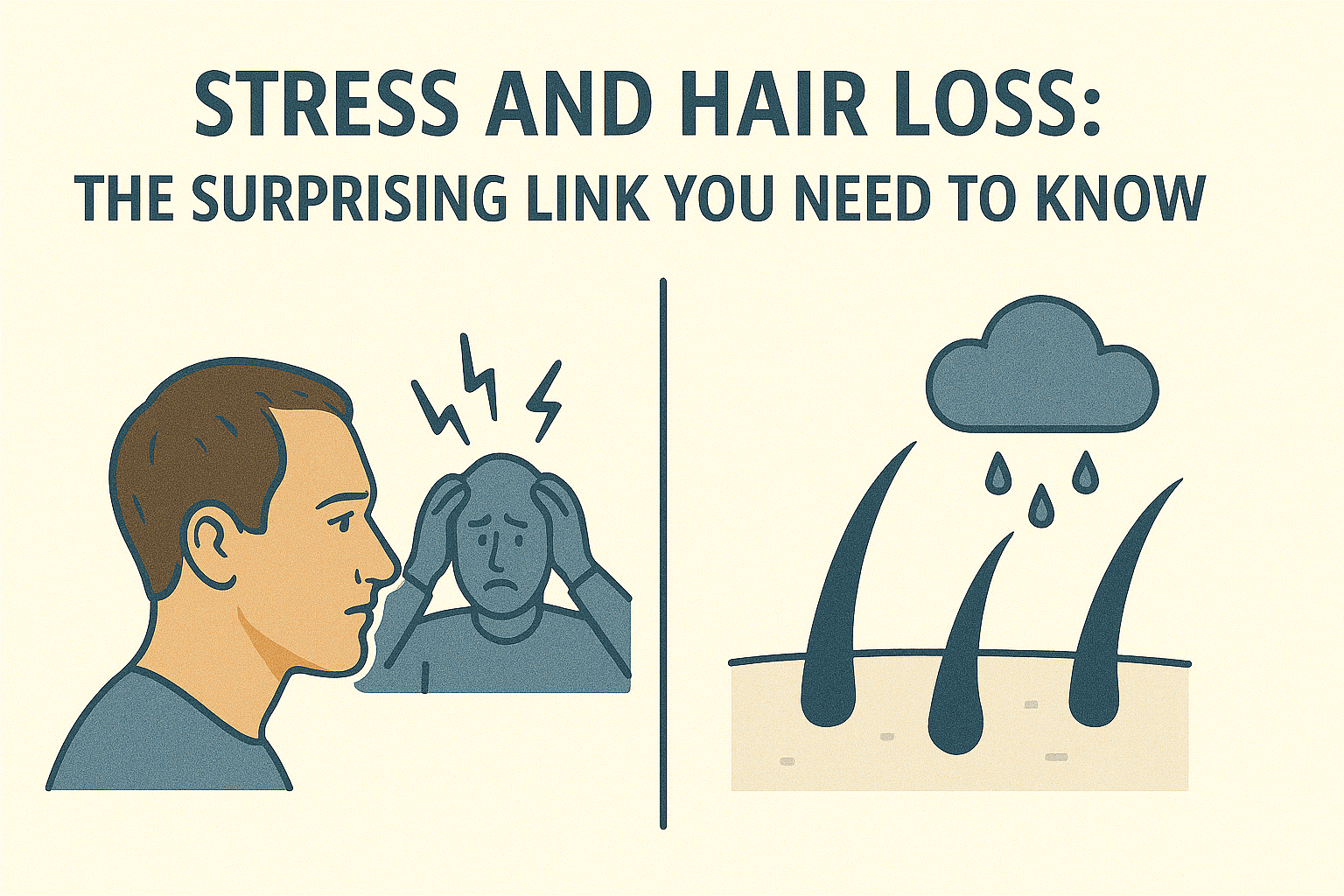Stress and Hair Loss: The Surprising Link You Need to Know
30th Oct 2025
Many people notice more hair shedding during stressful times. The truth is that stress does not just affect your mood; it also affects your scalp. This guide explains how stress causes hair loss, how to spot the signs early, and what you can do to stop it.
How Stress Triggers Hair Loss
Your hair grows in cycles. When stress hits, that balance changes. More follicles move from the growth phase into the resting or shedding phase. This leads to visible thinning.
There are three main stress-related types of hair loss:
-
Telogen Effluvium
Short-term stress pushes many hairs into the resting phase at once. You will notice more shedding a few months later. -
Alopecia Areata
Severe or long-term stress can confuse your immune system. It starts attacking your hair follicles, creating patchy bald spots. -
Trichotillomania
This is the urge to pull out your own hair during anxiety or tension. It is a behavioral condition linked to emotional distress.
Each type can affect anyone, men or women, and often appears after emotional or physical strain.
What Happens Inside the Body
When you feel stress, your body releases cortisol, a hormone that prepares you for “fight or flight.” High cortisol levels can:
-
Slow new hair growth
-
Weaken existing follicles
-
Disrupt blood flow to the scalp
Over time, chronic stress may shorten the growth cycle. Your hair becomes thinner, weaker, and sheds faster.
Early Signs of Stress-Related Hair Loss
Watch for these common signs:
-
More hair in your brush or shower drain
-
Thinning around the temples or crown
-
A wider hair part
-
Slower regrowth after shedding
Catching these signs early makes recovery easier.
Read how to monitor your progress in How to Track Your Hair Growth: Simple Methods That Work.
How to Stop Stress-Related Hair Loss
1. Lower Stress Levels
Simple daily habits help keep cortisol under control:
-
Take regular breaks
-
Sleep at least 7 hours
-
Exercise or stretch
-
Practice breathing or meditation
2. Support Your Scalp
Use gentle shampoos and avoid tight hairstyles or harsh chemicals. A clean, calm scalp helps hair grow better.
3. Strengthen Follicles
Topical treatments such as Xandrox 15% Minoxidil + Azelaic Acid can support hair recovery. They help improve blood flow and extend the growth phase.
For a full comparison of topicals, visit Xandrox vs Rogaine: The Honest Comparison That Matters.
4. Eat for Hair Health
Your hair needs nutrients to stay strong. Eat foods rich in:
-
Protein such as eggs, fish, and lentils
-
Iron from spinach and red meat
-
Zinc from nuts and seeds
-
Vitamin D and biotin
5. Seek Expert Help
If hair loss continues, speak to a dermatologist or hair specialist. They can test for underlying issues and recommend treatment plans like PRP therapy or stem cell based options.
Read more about new methods in The Future of Hair Regrowth: Stem Cells, PRP & Beyond.
Recovery Timeline
Hair usually starts to regrow within 3 to 6 months after stress levels drop. For some people, it may take longer. Staying patient and consistent with care is key.
You can also pair stress management with proven topical care. Learn more in Hair Transplants vs Topicals: Which Option Is Right for You.
FAQs
Q1. How long after stress does hair loss start?
Usually 2 to 3 months after a stressful event. The delay happens because the hair cycle takes time to show changes.
Q2. Does hair grow back after stress?
Yes. In most cases, hair regrows once stress is managed. The follicles are still alive and can recover.
Q3. Can meditation or yoga help with hair loss?
Yes. Regular relaxation lowers cortisol levels, which helps protect hair follicles.
Q4. Should I use a topical like Minoxidil for stress hair loss?
It can help strengthen follicles and speed recovery. Always check with a specialist first.
Q5. How can I prevent future shedding?
Keep stress low, maintain a balanced diet, and follow a consistent scalp care routine.
Final Thoughts
Stress is part of life, but hair loss does not have to be. Once you understand the link, you can act early and protect your scalp.
Focus on stress control, nutrition, and proven treatments like Xandrox Minoxidil for the best recovery. For expert advice and personalized support, contact Xandrox.
